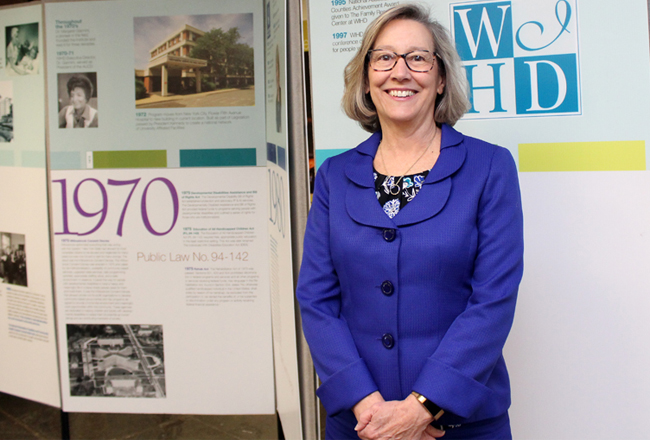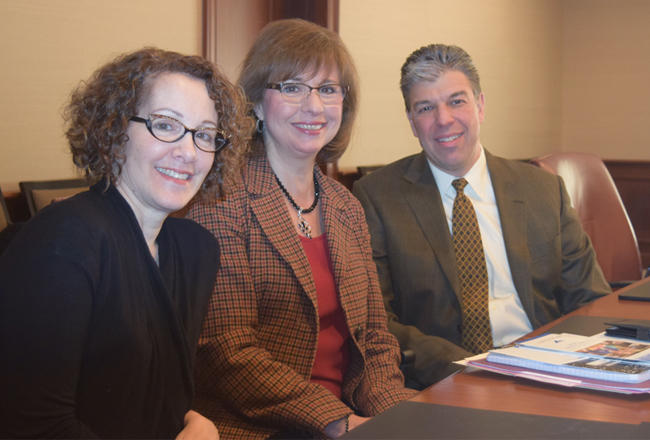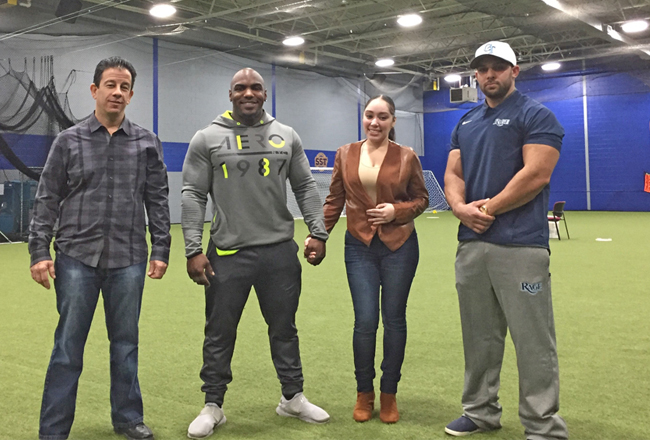
As leader of the Westchester Institute for Human Development (WIHD), Susan Fox oversees an organization that provides specialized medical, dental and psychological services to more than 5,000 people with intellectual and development disabilities each year.
Fox, born in Nebraska and raised in Massachusetts, has been president and CEO of the Valhalla-based medical center and service provider since 2016. Before WIHD, Fox was associate director at the University of New Hampshire”™s Institute on Disability. She also served as the state director for developmental disabilities services in New Hampshire for five years.
She met in December with the Business Journal to discuss WIHD, her goals for the organization and the challenges it faces today and moving forward.
What drew you to this profession?
“It”™s a long road. But I think back to, in high school, there was a very small special education program in our school. I became friendly with one of the students who was in my class, who was in the special education program. We remain friends today. So I think I always had an empathy and interest in people who have disabilities.
“That”™s where I started. Then going to college, I wasn”™t sure what I wanted to do. I was taking classes in a variety of areas. I had three or four different majors in my first couple years. I ended up taking a class in learning disabilities and was fascinated with the concepts of how people learn, the differences in learning styles. That got me started. I graduated from college at a time when special education programs were just starting to be mandated federally in every school. So there was a need for a lot of special education teachers, and I was able to get a job right out of college teaching special education. It kind of grew from there.
“On a personal level, my husband, David, and I adopted a young girl, Lori, who had very significant disabilities when she was about 5. She”™s now 37, so she has kept me more grounded in the field and maintained my passion in wanting to make sure that there are good, high-quality services available for people with disabilities.”
Can you give an overview of the organization and its goals?
“We provide a comprehensive array of medical, clinical and social services, primarily to people with intellectual and developmental disabilities. We also have a very large child welfare program. We serve children in the child welfare system who are in family foster care.
“But what really makes us unique is that we not only provide those direct services to individuals, we also are an academic and research institution. So we do research related to those services to better inform the field, identify best practices and change how services are provided. And then we do a lot of education and training for both students in school as well as current professionals.”
What is going on in the WIHD on a typical Monday?
“Mondays are typically very busy. We run a medical clinic on the second floor. We have primary care plus 17 specialty care services. Pretty much any specialty care: psychology, endocrinology, neurology, dieticians, cardiologists. They are all here, so people are coming in for appointments, seeing primary care physicians or other specialties. We have a large dental clinic on the fourth floor, so people will be coming in to see the dentist. We have a large speech and hearing clinic, so people will be coming in for either speech therapy or for hearing checks.
“We serve people of all ages, children through adults.
“We are the largest private provider of child welfare services for Westchester County. We also manage the Children”™s Advocacy Center. The center is the group of individuals who investigate all instances of child abuse or child death. We lead that team. We employ a forensic pediatrician. But the team is made up of the county prosecutor, the DA, the police, social workers, all the people that might be involved in a child abuse situation.”
What was the first year on the job with WIHD like?
“I really spent time getting to know the organization. I had many, many, many meetings with staff throughout the organization, as well as the board, community members. From there, I was able to formulate some of my own goals for the organization.”
I imagine you had to learn the area as well.
“Yes, the area was new to me. Although I have to say, living in Westchester County, people often say it must be so different from New Hampshire. But I think Westchester, because it has more forests and hiking trails and the river, it doesn”™t feel so big city-ish.”
Can you describe some of the challenges the organization is facing?
“We rely very heavily on Medicare and Medicaid funding for the direct services we provide. That”™s always a challenge. We”™re paying attention to changes in Medicare and Medicaid and what”™s happening at the federal level.
“We have a pretty diverse funding stream, with state contracts, county contracts and grants. But we are a nonprofit agency, so we are always looking to maintain good, solid funding.
“Our biggest challenge is that we are in a building that was built in 1972. It was built as an inpatient facility and residential school for kids with special needs. Today, it”™s an outpatient facility doing a much different type of business. So we”™re trying to figure out what to do about our building, whether to stay here, renovate or to move to a building. That”™s a big challenge and it will be an expensive challenge for us.”
We may have just covered a big one ”” facilities ”” but what are some other initiatives you plan to take on in your leadership of this organization?
“What I found when I came here, staff identify very much with the department they work in, but did not identify as strongly to the larger organization. I”™ve done a lot of work since I”™ve come here to really build employee engagement and that sense of belonging to this larger organization with a bigger mission to improve the lives of people with disabilities.
“I”™ve also tried to be very involved and engaged in the business community to get people more aware of who we are and what we do. I often say we are this hidden gem here. We do all these really amazing things and people don”™t know about us. We”™ve been working to increase our visibility in the community. We want people to be aware of who we are, that we are here and we are here to help.
“I feel really fortunate to have landed here at WIHD, this organization that is very mission-driven and is full of people who are committed, talented and passionate about this work. Many of the people who work here are parents of individuals with disabilities. They are in this because they have a real personal and professional commitment to the field. It”™s really a great way to work.”






















